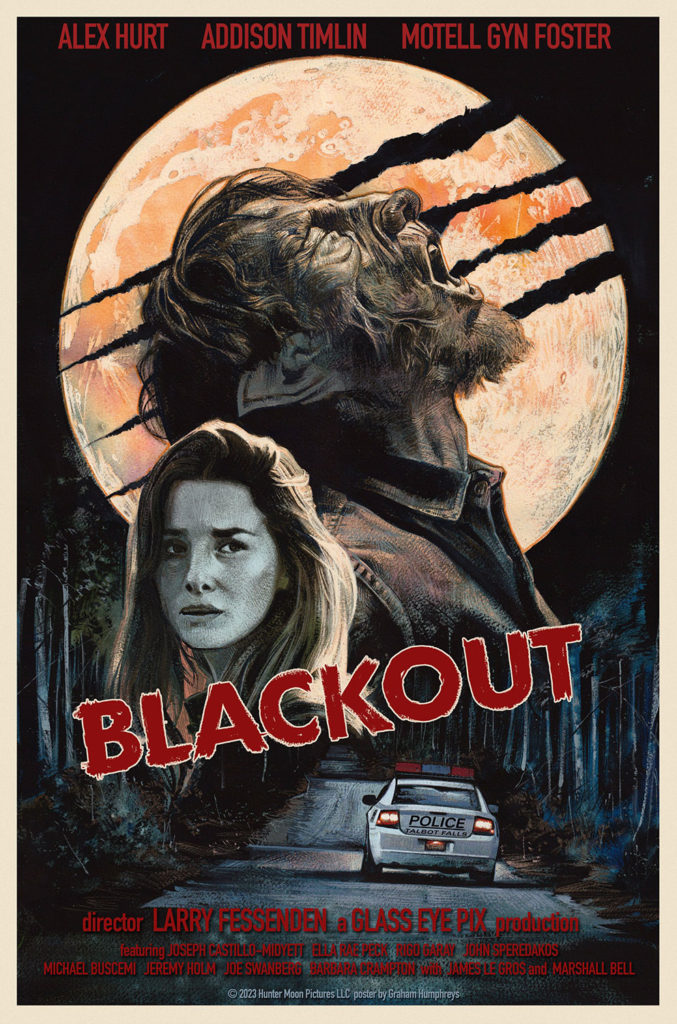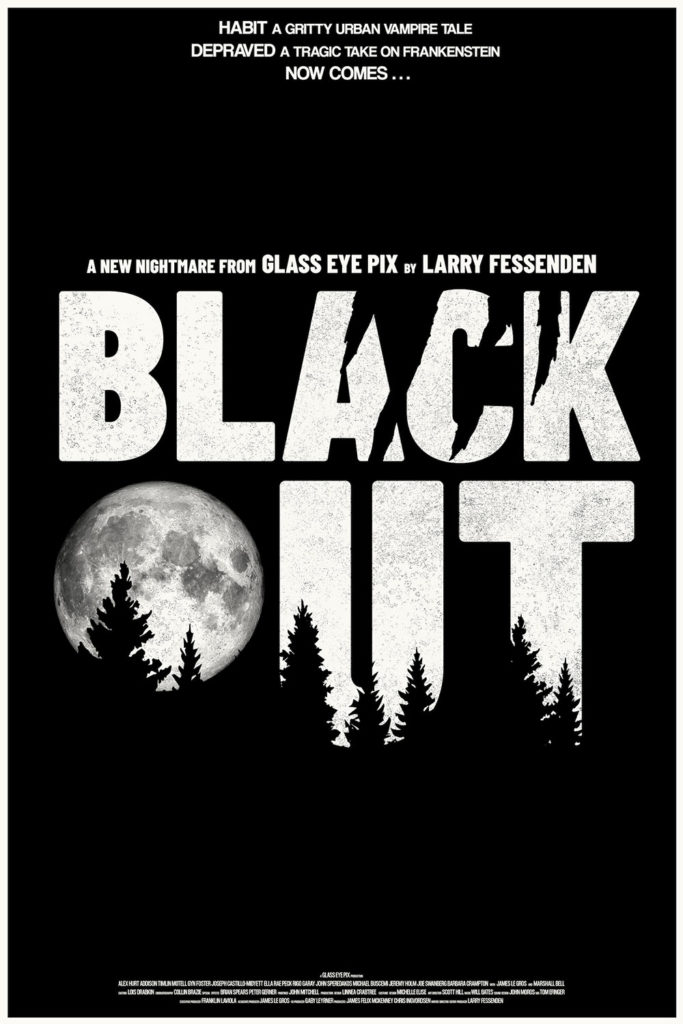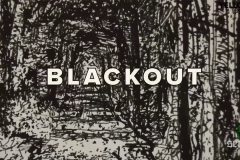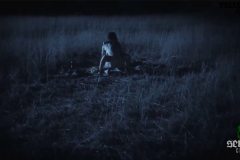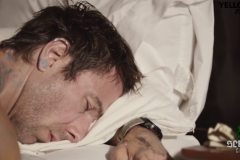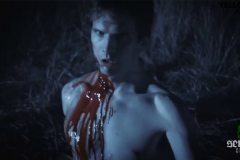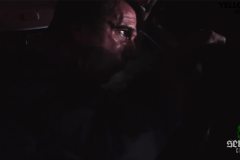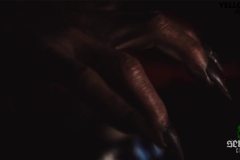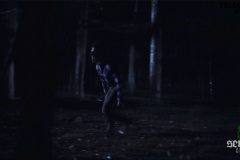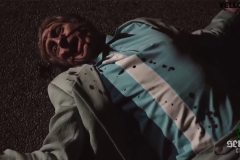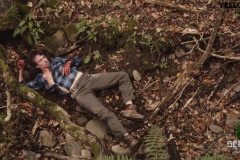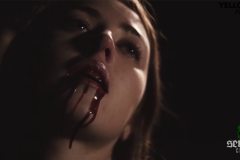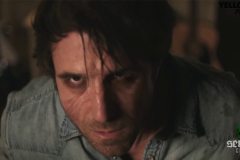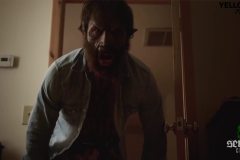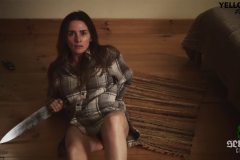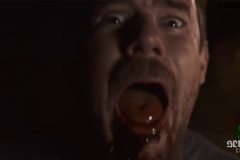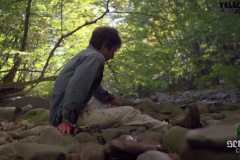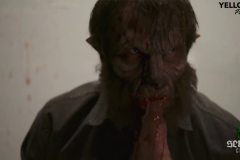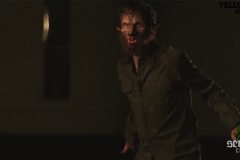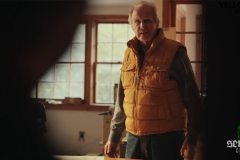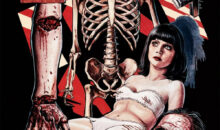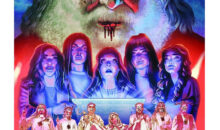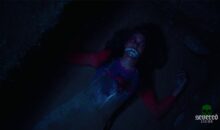Review: BlackOut at Fantasia 2023 – A Werewolf Tale of Internal Struggle and Artistic Ambitions
Larry Fessenden (Habit, Wendigo, Stake Land: Origins) is a virtuoso of the independent horror scene. Writer, Producer, Director, Editor, and Actor. In his film BlackOut – which recently screened at Fantasia 2023 — we see the portrait of a man in the midst of an existential crisis, Charley, played intensely by Alex Hurt. Charley is an artist, and a good one I might add, who has recently bent away from his usual landscape paintings towards more introspective portraits, dark woods, and even to the victims of recently murdered townsfolk.
Charley has a lot of unresolved emotions over his recent ex-girlfriend who has found a new boyfriend. Worse still is her disapproving Father, Hammond, the town patriarch, played with gusto by Marshall Bell (Starship Troopers, Total Recall), who gives a terrific hard-ass performance. Hammond has been edging her away from him from the beginning and considers Charley a ‘lost soul’ (code for shiftless alcoholic). Not so coincidentally, Hammond also used to be Charley’s father’s business partner. Charley seems angry with his dead father who ‘made this town’, and whom Hammond has fond memories of. Charley even seduces a lawyer to find ‘anything’ against his dad’s reputation legally within his personal contracts.
The world Charley is upset with is primarily very First World in nature and his angst at times seems bourgeoisie in that he can ‘take or leave’ his problems which led this reviewer to being more captivated by the internal struggle of Charley rather than the lower-stakes External World of who gets the town contract: Americans or Mexicans. Charley drinks with local Mexican builders, one of whom is later accused of committing one of the rash of murders happening across town.
The internal dilemma intensifies when we discover Charley realizes he’s a werewolf and needs to be stopped but cannot remember how it all began, hence the blackout drunk status that covers his memories like a dark shroud; haunted and confused further by the long shadow of his crushingly successful, now deceased father. Charley eventually uses his werewolf abilities to damage Hammond in lieu of his father who represents all the things he uncontrollably hates.
BlackOut Downers:
Shocking nudity with blood is fine in the horror genre. Welcome even. That is, as long as it aides the undercurrent of the story. But, in this case, it seems out of sorts with the rest of the story being told. That said, the nudity and blood as stand-alone imagery is shocking and memorable as a cut-away but does not stitch back together into the story to add anything other than a dose of adrenaline (which is too bad because they were interesting to look at). But if he was supposed to be a womanizer it got muddled by all the personal feelings of the lead for his Ex, which obscured this aspect for most of the movie. I feel the womanizing and alcoholism ought to have been highlighted more in this to flesh out the “black out” metaphor more roundly, but the film focused on the group dynamics and went the Lone Star (1996) route instead with the B-plot.
The Silver Lining on the Downers:
The most remarkable (partial) nudity, which was on point from a narrative perspective, came from Alex Hurt, who’s real life father, William Hurt (Body Heat, Altered States, The Big Chill), was also known for not being afraid of the occasional nude scene himself, as I recall. But suffice it to say his son adds value in every scene he goes shirtless.
BlackOut Uppers:
The directing and editing were superb but in the sense of a high-end television show, and I mean that in the best way possible. Recent golden-era style television, straddling realism with the occasional burst into Hannibal-styled grotesqueness. The werewolf itself was well designed on a variety of levels in the variety of incarnations where we catch a glimpse of it.
BlackOut is by far above average for the werewolf subgenre, which generally takes a steep nosedive after American Werewolf in London (1981), The Wolf Man (1941), Ginger Snaps (2000), The Howling (1981-2011) which were just a series of dynamic effects shots if we’re being serious, and Dog Soldiers (2002). Other memorable werewolf mentions are The Company of Wolves (1984), Werewolves on Wheels (1971) and Monster Dog (1984) starring Alice Cooper, with a terrific dubbed over voice work that is worth the watch for that element alone. But that is where the cliff’s edge ends, and you end up in low budget Tubi Hell.
Overall BlackOut would make a great calling card towards a Netflix series. I was getting engrossed in the small-town dynamic and appreciated the sound and musical decisions. I wanted to see more, but alas, like all werewolf films, the end was nigh for the afflicted. And in terms of whether it is underground or not? This film is mainstream yet thoughtful. But it is definitely not underground. It aspires for more without really being willing to sit in the muck for too long without wanting to end it all.
Directed by: Larry Fessenden
Written by: Larry Fessenden
Produced by: Larry Fessenden, J. Christian Ingvordsen, James Felix McKenney, Gaby Leyner
Cinematography by: Collin Brazie
Editing by: Chris Ramey
Music by: Will Bates
Special Effects by: Brian Spears
Cast: Joseph Castillo-Midyett, Ella Rae Peck, Rigo Garay, John Sperkedakos, Marshall Bell, Michael Buscemi,Jeremy Holm, Joe Swanberg, Barbara Crampton, James Le Gros
Year: 2023
Country: USA
Language: English
Colour: Colour
Runtime: 1h 44min
Studio: Glass Eye Pix
Distributor: Yellow Veil Pictures


